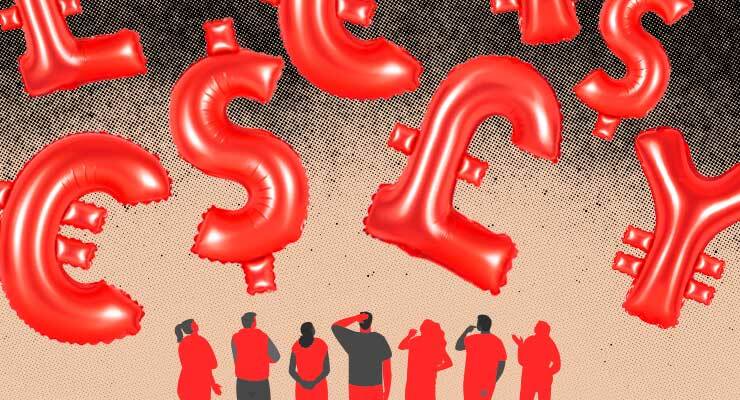
Yesterday Canada’s central bank lifted its cash rate by 1%. Inflation there is 7.7%. Now, the question is whether the US Federal Reserve will do the same at its next meeting later this month. Overnight, the latest American consumer price data showed inflation hitting a 40-year-plus record rate of 9.1% in June.
Across developed economies, there is now an arms race in rate rises: from 0.50%, which was once considered to be extreme but is now commonplace, to 0.75% (now standard) to 1%, now a strong tip rather than an outlier. The Reserve Bank of NZ yesterday posted its third 0.50% rise in a row.
And the lessons, if any, for Australia? It largely depends on the consumer price index (CPI) to be released in the final week of this month. Economists are already forecasting a rise of up to 2% for the quarter to take the annual inflation rate past 7%. Year on year to the end of March, it was 5.1%.
The most important part of the US data for ordinary American workers came in a separate statement from the Bureau of Labor Studies (BLS), which confirmed that the pay of tens of millions of American workers went backwards, again. The BLS said inflation-adjusted incomes, based on average hourly earnings, fell 1% for the month and were down 3.6% from a year ago and faster than the 3% fall in the year to May.
That is already happening in Australia, and the fall in real wages will only increase over the next year, despite talk about big wage rises in the offing. In Australia, the core inflation rate (which excludes the more volatile food and energy sectors) was 3.7% in the year to March. Some forecasts see that rising past 5% in the June quarter, with more pressure to come in the September quarter from higher energy (electricity and gas) prices from July 1.
The September and December quarters will see the headline CPI rate boosted by the end of the 22-cents-a-litre cut in the petrol tax in mid-September.
That’s why some local economists are not ruling out the RBA lifting the cash rate in August or September by 1%. Central banks seem to have abandoned the niceties of small, incremental increases in cash rates in the face of surging cost rises.
The 9.1% US CPI rise was reported a couple of hours before the Bank of Canada decision and came as a shock. The rise was up from 8.6% in May and well ahead of the 8.8% rise forecast by the market. Core CPI rose 5.9%, also above the 5.7% estimate, according to the report from the Bureau of Labor Studies.
The stronger-than-forecast outcome also raised new questions about whether inflation in the US has peaked. Headline CPI was up 1.3% and core CPI rose 0.7% on a monthly basis, compared with estimates of 1.1% and 0.5%, respectively.
The report saw more US analysts claim the surge would result in a recession after bigger rate rises from the Fed. Liz Ann Sonders from financial services giant Charles Schwab said: “There’s no spinning this, other than the Fed has to get more aggressive near term and crush demand. That cements a recession now. I think a recession is an inevitability.”
James Knightley, ING’s chief international economist, was a little more circumspect: “With supply conditions showing little sign of improvement, the onus is on the Fed to hit the brakes via higher rates to allow demand to better match supply conditions. The recession threat is rising.”
Whatever happens next here, there is no doubt inflation remains on the march.








So with real wages declining surely that is a suppressive influence on spending without raising borrowing rates. It’s already entrenched in the economic system so no need to do anything there. Perhaps legislating higher interest rates for savings accounts particularly mortgage offset accounts will take some of the cash out of the system as people choose to take higher returns rather than spend in the short term. How about price freezing on essentials, I know, shock horror we can’t have the ‘market’ pay for anything. Then there’s a super profits tax on the big 2 supermarkets, fossil fuel companies & a super wealth tax on the ‘big end of town’. Withdrawal of government spending on the luxury of government like booze ups in parliament, chauffeur driven cars, maybe ALL members of parliament could get by with only one staffer not just the cross benchers, real wage cuts for members of parliament, reserve bank & public service executives? Anyway, vive le revolution or recession whichever is your poison!
One comment implies no one gives a damn … yet.